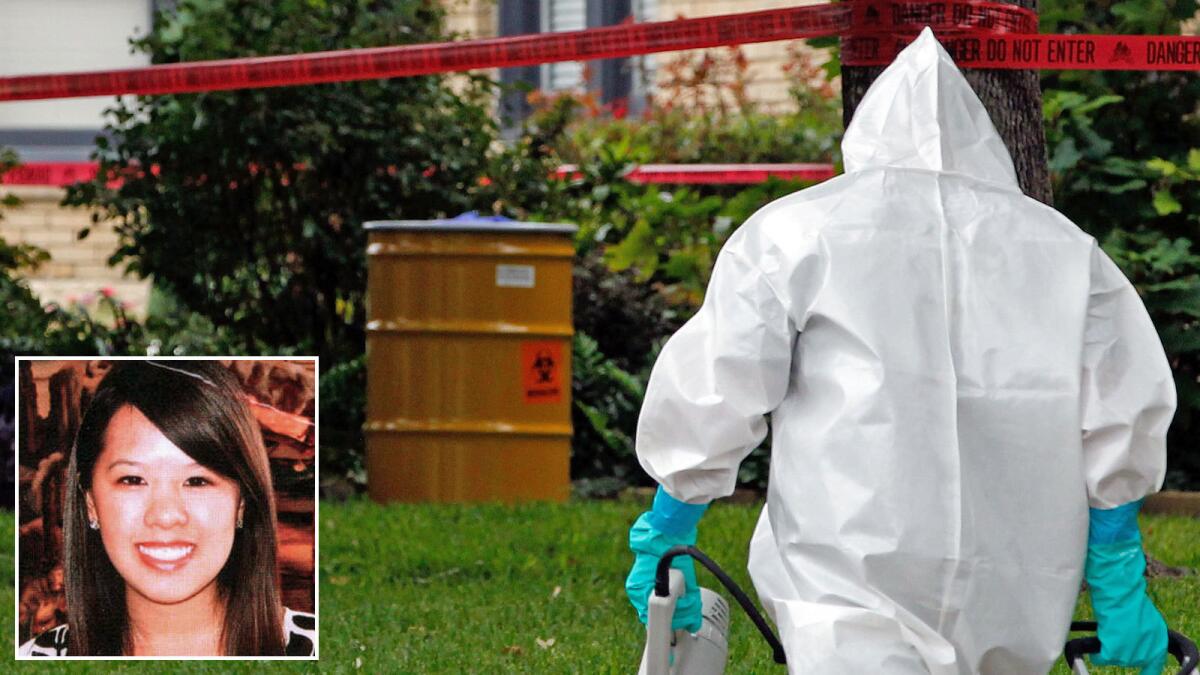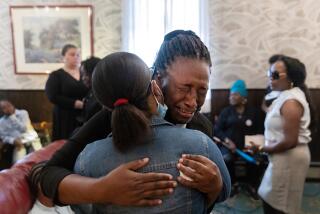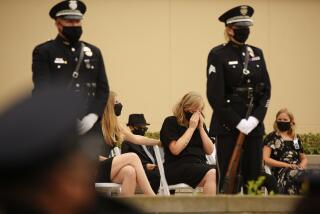Error in Dallas may have exposed others to Ebola, CDC chief says

- Share via
Reporting from Dallas — The misstep that allowed a Texas nurse to contract Ebola while treating a patient may have exposed others to the virus, the nation’s leading healthcare official said Monday as experts stepped up scrutiny of medical workers at the hospital where the breach occurred.
The second case of Ebola diagnosed in this country came after American officials had insisted for weeks there was a minuscule chance of the virus penetrating the U.S. healthcare system. The case raised questions on several fronts: the preparedness of medical facilities to handle Ebola patients properly; the funding available for hospitals to ready themselves for pandemics; the policy of allowing people from the hardest-hit African nations to enter the United States.
In Dallas, officials were even faced with how to handle the ill nurse’s pet dog. Texas Health Commissioner David Lakey said officials had decontaminated the patient’s apartment and were looking for a location that would allow “proper monitoring” of the dog, a 1-year-old King Charles spaniel she referred to online as Bentley.
“One and only one” person is known to have had direct contact with the nurse, Nina Pham, said Thomas Frieden, director of the U.S. Centers for Disease Control and Prevention. Neither that person, who is being monitored, nor the dog has shown symptoms of illness.
But Frieden said a “large number” of medical workers who worked with Pham while she was treating a Liberian man for Ebola could have been exposed to the deadly virus if they were affected by the same protocol breach that led to her illness. Pham became sick after treating Thomas Eric Duncan, who was hospitalized at Texas Health Presbyterian Hospital in Dallas on Sept. 28. He died Wednesday.
“We need to consider the possibility there could be additional cases, particularly among the healthcare workers who cared for the … patient when he was so ill,” Frieden said. “We’re concerned and unfortunately would not be surprised if we did see additional cases among healthcare workers.
“The thinking here is straightforward,” Frieden said. “If this one individual was infected … it is possible other individuals could have been infected as well.”
As Frieden spoke, CDC experts at Texas Health Presbyterian were watching hospital staff as they entered and left Pham’s room, and as they donned and removed the protective gloves, masks, hoods and cloaks required to treat Ebola patients.
Their goal was to learn what went wrong at the hospital, which is also facing questions about its treatment of Duncan on his first visit to the emergency room Sept. 25. Duncan, who arrived in the U.S. on Sept. 20, complained days later of abdominal pain and a fever. Both are Ebola symptoms.
The hospital has said a nurse followed CDC protocol in asking whether Duncan had been in Africa recently. Duncan said he had, but was sent away with a prescription for antibiotics. Three days later, he returned in an ambulance and tested positive for Ebola.
A total of 48 people who had contact with Duncan are being monitored for fever or other symptoms until Sunday, the end of the 21-day Ebola incubation period. None has become ill.
Duncan’s fiancee, Louise Troh, is among them. Reached by telephone Monday, she said she was “feeling all right” but feared her connection to Duncan would stigmatize her.
“I don’t want people putting that on me, saying I have Ebola,” said Troh, who has lived in the U.S. for more than 15 years. She has been isolated from most of her relatives since Sept. 28. “I’m hurt; I don’t have anyone to cry on,” she said.
Frieden said officials didn’t know how many more people would need isolating as a result of Pham’s illness. He described Pham as “clinically stable.”
Friends of the family said Pham, 26, graduated from Nolan Catholic High School in Fort Worth in 2006. Four years later, she graduated from Texas Christian University with a nursing degree, a university spokeswoman confirmed.
A family friend, Tom Ha, described her as a “very devoted Catholic” for whom other people “always come first.”
Her priest, the Rev. Jim Ngo Hoang Khoi of Our Lady of Fatima Church in Fort Worth, said she had received a blood transfusion from an Ebola survivor, according to her mother, Ngoc “Diana” Pham. A survivor’s blood contains antibodies to the virus. The World Health Organization has endorsed such transfusions, although their usefulness as a treatment is unproven.
Dr. Kent Brantly has donated blood to two other Ebola patients. One has recovered and been released from the hospital; the other appears to be improving.
Samaritan’s Purse, the aid group that Brantly worked for in Liberia when he contracted Ebola this year, confirmed he had donated blood plasma to Pham. He had also offered to donate to Duncan, Samaritan’s Purse said, but their blood types did not match.
Pham is “very lucky” to be a match, her priest said.
Ngo said Pham’s mother is staying at a hotel near the hospital and has been communicating with her daughter via Skype and cellphone.
He characterized Pham as “very calm and hopeful.”
The hospital said Sunday that one “close contact” of Pham had been “proactively placed in isolation.” Ngo described that person as a friend of Pham.
Before Pham became ill, Ngo said, her mother had urged her to quit, saying the work was dangerous. She refused.
“She was not scared to care for Mr. Duncan,” said Kim Tran, a parishioner and a friend of Pham’s mother.
“I recall her words exactly,” Tran said. “‘Mother, I assure you I am OK. I am taking care of the patient. He needs me.’”
Parishioners think about Pham often, Ngo said. “We keep her in our prayers every day.”
Dallas County Judge Clay Jenkins said he visited Sunday with colleagues and relatives of the patient, whom he refrained from identifying. He called them “an intensely private but heroic family.”
Jenkins said the patient was “a hero because she picked a field where she knew she could catch a virus from the people she is trying to help,” adding that she was dealing with her diagnosis “with grace.”
Her co-workers are “quite emotional,” he said. “It’s one team, one fight. They’re going through a range of emotions right now: concern for a friend, concern for themselves. A lot of tears. ... But they’re going about their jobs and integrating well with the outside specialists who have been brought in.”
Pham is concerned about her dog, which county officials moved from her apartment to an undisclosed location, Jenkins said.
“The dog is important to her, so the dog will be well cared for,” he said.
In Spain, after a nurse was diagnosed with Ebola, officials euthanized her dog, despite public entreaties to save it.
The CDC says there have been no reports of dogs or cats becoming ill with Ebola, nor of their transmitting the virus. “There is limited evidence that dogs become infected with Ebola virus, but there is no evidence that they develop the disease,” the CDC’s website says.
Frieden of the CDC did not mention Pham by name, but praised her and other healthcare workers at Texas Health Presbyterian. He said they should not be blamed for whatever protocol breach occurred.
“The enemy here is a virus, Ebola,” he said. “It’s not a person; it’s not a country; it’s not a place; it’s not a hospital.”
But fear, anger and frustration were rising in the wake of the two Ebola cases.
Some healthcare workers who do not work at Texas Health Presbyterian said Ebola patients should be treated only at the four U.S. facilities with specially built biocontainment units.
Sherri West, 54, said officials should have transferred Duncan. “They dropped the ball,” the healthcare worker said as she left work near Texas Health Presbyterian. “They should have been saying: ‘This man has Ebola. We need to get him out of here. We can’t handle it.’”
Three U.S. aid workers who contracted Ebola in Africa and who were flown to the United States for care were successfully treated in those units, which are in Atlanta; Ft. Detrick, Md.; Omaha; and Missoula, Mont. Brantly, the blood donor, is among them.
Another American who is being treated in Omaha, freelance cameraman Ashoka Mukpo, also received Brantly’s blood. Mukpo was described Monday as sitting up, eating and drinking. Mukpo was working in Liberia for NBC when he became sick, and arrived in Nebraska for treatment Oct. 6.
“Feeling like I’m on the road to good health,” Mukpo, 33, wrote Monday on Twitter.
Amid growing criticism, the White House tried to show President Obama engaged in the crisis. He met with top officials and urged them to speed up the review of what happened in Dallas. A White House summary of the meeting said officials had briefed Obama on efforts to increase training for healthcare workers.
Obama also called French President Francois Hollande to discuss increased airport screening, the White House said. Some European countries have been slower to screen passengers for signs of infection.
Calls continued for the Obama administration to consider banning travel from some African countries.
More than 4,000 people have died from confirmed or suspected Ebola in West Africa since the current outbreak began in March, according to the World Health Organization. Frieden has said travel bans would not stop the outbreak because it would prevent aid workers, medical experts and military troops from quickly getting where they are needed.
Sen. Bob Casey (D-Pa.), a member of the Senate Health, Education, Labor and Pensions Committee, said federal funding for a program to prepare hospitals to fight pandemics had been halved since 2003. The Hospital Preparedness Program is suffering from “chronic underfunding,” Casey said in a statement. “The drastic cuts that have hit the [program] should be reversed.”
On Saturday, enhanced screening began at New York’s John F. Kennedy International Airport for people arriving from Liberia, Sierra Leone and Guinea, the hardest-hit countries. None of those arriving whose temperatures were taken were found to be ill. Since March, none of the 77 people prevented from boarding planes in West Africa has tested positive for Ebola.
Enhanced screening is set to begin this week at airports in Newark, N.J.; Atlanta; Washington, D.C.; and Chicago.
Hennessy-Fiske reported from Dallas and Susman from New York. Times staff writers Anh Do and Lauren Raab in Los Angeles and Kathleen Hennessey and Michael A. Memoli in Washington contributed to this report.
@mollyhf
@TinaSusman
More to Read
Sign up for Essential California
The most important California stories and recommendations in your inbox every morning.
You may occasionally receive promotional content from the Los Angeles Times.












